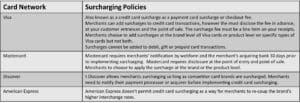The Challenge
Repair shops -want to reduce your swipe fees? You can with a simple change to how you accept credit card payments.
Research has shown that consumers keep their cars longer to avoid high monthly payments, investing in repairs and maintenance instead. Consumers now spend an average of $548.32 fixing their cars, according to data from Cox Automotive.
How Are Your Customers Paying for these Repairs?
According to Cars.com research, one in three customers can only pay for these repairs if they go into debt, meaning they use a credit card that costs you 3% of the repair order total.
Let’s assume you write 500 repair orders a month, and 66% are paid on credit cards, at $550, and your cost of processing (net effective rate) is 3%; you are shelling out over $5,445 a month in processing fees on credit cards for the service drive alone.
Then, let’s take a minute to outline the cost of regulated debit cards (around 25 bpts + $0.22 per item for regulated banks), and 1.65% + $0.10 for non-regulated debit cards. Building on the example above, Let’s assume that 30% of the 500 monthly service orders are paid by debit card, the balance in cash. Of the 30%, we’ll assume they are divided equally between regulated and non-regulated debit cards. Your processing cost for the debit transactions was $256.
The total cost for all payment processing is $5,455 (Credit cards) + $256 (debit cards) = $5,701
The Solution – Why Credit Card Surcharging Makes Sense for Repair Shops
The average profit margin for the automotive repair industry is between 20-28% for parts and 50-65% for labor. And as NADA research indicates, service/fixed ops contribute 49% (up from 45% in just a few years) of gross profits.
So, any increase in service /fixed ops profitability will significantly impact overall profitability. While repair orders for one than one service and more maintenance orders are essential, one often overlooked way to improve service margins is to add a surcharge fee to each bill. Consumers are already familiar with and pay fees.
Credit card surcharging is when you charge an additional fee to customers who pay for their parts and repairs using credit cards. Surcharge fees are required to be the shops’ actual cost of processing or up to a maximum of 3%.
Going back to our example above, a 3% surcharge would reduce the monthly credit card processing costs from $5,701 to just $256.
The “Other” Benefits of Credit Card Surcharging:
-
Cost Transparency
Transparency is key to establishing trust with customers. With credit card surcharging, repair shops can provide a clear breakdown of costs, ensuring customers know the fees associated with credit card payments. By offering transparency, shops can foster stronger relationships with their customers, who appreciate honesty and openness in their transactions.
-
Incentivizing Cash Payments

While credit cards offer convenience, debit card payments come with lower transaction costs. By implementing surcharges on credit card transactions, shops can incentivize customers to consider alternative payment methods, such as financing, cash, or debit cards. Leading to reduced expenses and increased cash flow, further boosting profitability.
-
Improved Customer Satisfaction
Contrary to popular belief, surcharging does not necessarily result in negative customer experiences. When properly communicated and implemented, it can have the opposite effect. By providing transparent pricing information and offering alternative payment options, shop owners can enhance customer satisfaction, especially among customers who pay with something other than credit cards.
Moreover, the money recouped from surcharging can be reinvested into improving the overall service experience, leading to happier customers.
Implementing Credit Card Surcharging: Best Practices
To successfully implement credit card surcharging, shop owners must follow certain best practices. Here are a few essentials to consider:
-
Comply with Applicable Laws and Regulations
Before implementing surcharging, you must familiarize yourself with your region’s laws and restrictions. States and even cities may have varying laws regarding credit card surcharging. For example, Colorado limits the maximum surcharge amount to 2%. New Jersey is considering a law to limit the surcharge to your actual processing cost.
Owners can ensure compliance with these regulations by working with DeskManagers’ preferred and sole surcharging and traditional payment provider – IntelliPay.
-
Card Network Rules
Compliance with card network (Visa, Mastercard, etc.) rules is a big deal. See the surcharging rules chart below. Non-compliance penalties include fines and the potential loss of card acceptance privileges. Payment processing with IntelliPay ensures shop compliance with card network rules.

-
Transparent Communication
Customer communication is essential when adding a surcharge fee to the repair orders of your customers who choose to pay with a credit card. Display notices, including the surcharge amount, at the entrances to your building and the point of sale, both online and offline. Providing a breakdown of costs and explaining the rationale behind the surcharge will minimize any potential backlash or customer dissatisfaction.
-
Train Staff
Properly train your staff to handle questions and concerns related to credit card surcharging. Equip them with the knowledge and communication skills to address customer inquiries effectively. This will help ensure a seamless customer experience and reduce confusion or friction during payment.
Repair Shops -Want to Reduce Your Swipe Fees? – Consider Surcharging
When implemented thoughtfully, credit card surcharging can be a valuable strategy for shops to boost profitability. By understanding the benefits of surcharging, adhering to best practices, and communicating transparently with customers, shop owners can harness the power of surcharging to ensure fixed ops success and enhance profitability. learn more about IntelliPay’s FairPay surcharging program here.


